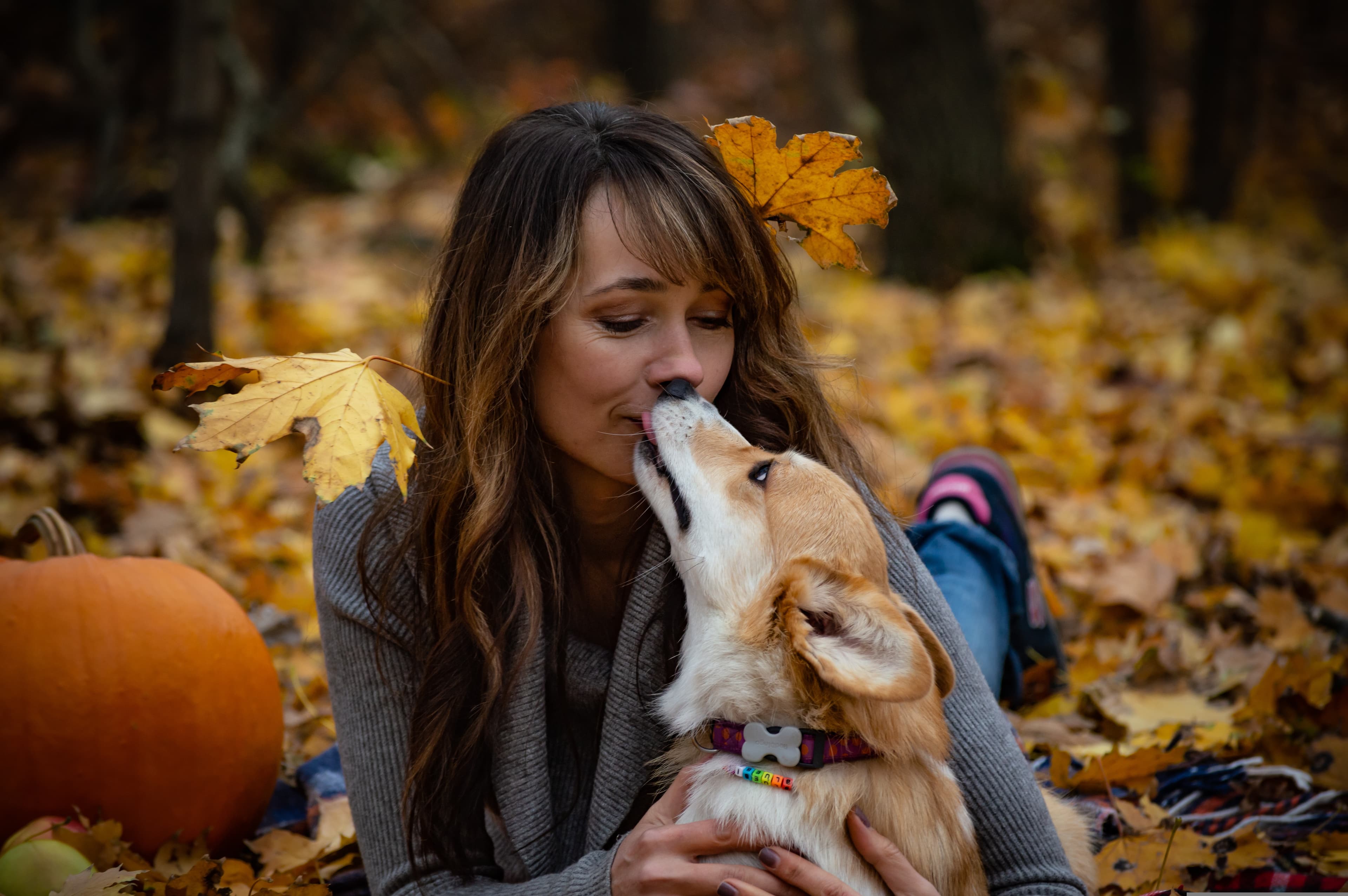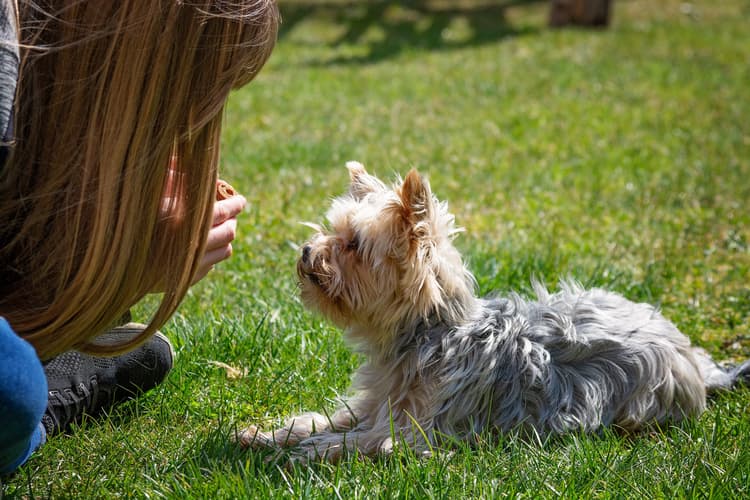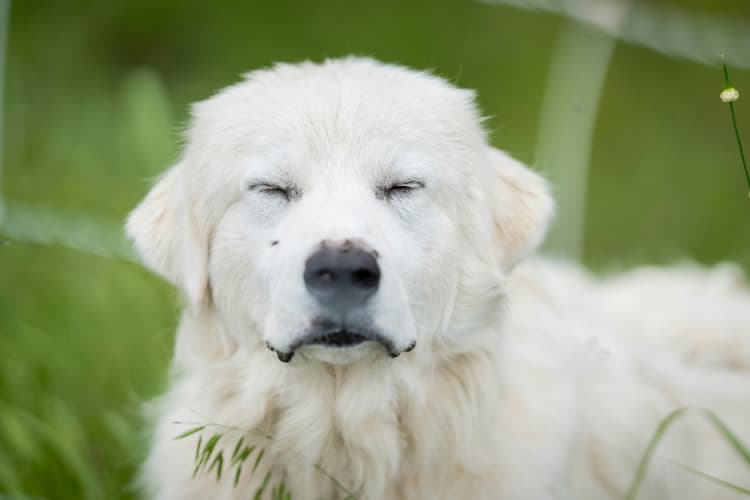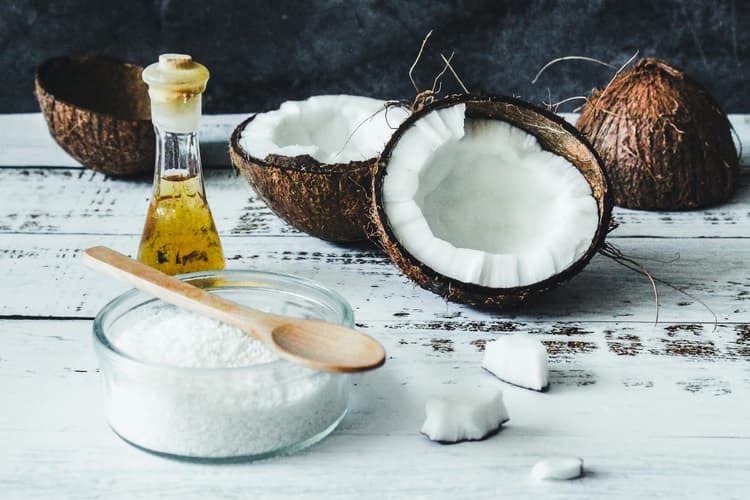Many pet owners find themselves wondering, “Why do dogs lick you?” — a behavior that can feel both affectionate and puzzling. Licking is one of the most common ways dogs communicate, yet it can have several meanings. Your dog might lick to show love and trust, enjoy the salty taste of your skin, or self-soothe when feeling anxious or bored. However, when licking becomes excessive, it could point to an underlying issue such as stress, discomfort, or even a skin irritation.
This guide explores the real reasons behind your dog’s licking behavior and offers gentle, effective ways to manage it — helping you understand what your dog is trying to tell you and how to keep them happy and healthy.
Why Do Dogs Lick You?
According to PetMD, licking is a completely natural canine behavior that serves several purposes. Dogs lick to bond with their humans and other pets, communicate emotions, explore new tastes and scents, groom themselves, and even calm down when they feel anxious. This simple act triggers the release of endorphins and dopamine — the “feel-good” chemicals in the brain — which help create a sense of comfort and security.
The meaning behind licking often depends on the context:
Who they’re licking (you, another dog, or themselves)
When it happens (during play, relaxation, or moments of stress)
Where it occurs (on your face, hands, or even objects like furniture)
Each scenario tells a slightly different story about your dog’s mood and intentions. Understanding these cues can help you better interpret what your furry friend is trying to say and respond in ways that strengthen your bond.
The Science Behind Licking: Smell, Taste, and Brain Chemistry

Dogs experience the world primarily through their noses and tongues. With an extraordinary sense of smell and far fewer taste buds than humans, licking allows them to “taste” scents and collect extra information about their surroundings — or about you. When your dog licks your skin, they’re not just showing affection; they’re gathering clues from tiny traces of sweat, lotion, or food particles that tell them more about your unique scent.
Some parts of the body are especially tempting because of the sweat glands located there. Eccrine gland, found on the hands, feet, and face, produce salty sweat that dogs find flavorful. Meanwhile, apocrine glands, located in areas like the ears, armpits, and groin, release stronger-smelling secretions rich in scent markers — a fascinating source of information for curious canines.
Beyond exploration, licking also triggers the release of endorphins and dopamine, chemicals that create a soothing, pleasurable feeling in a dog’s brain. Over time, this natural “reward” can make licking a comforting habit, especially when your dog feels anxious, lonely, or bored. Understanding this connection can help you distinguish between normal, affectionate licking and behavior that may need gentle redirection.
Puppy Roots and Social Signals: From Nursery to Greeting Rituals

What does it mean when a dog licks you? From the moment they’re born, licking plays a vital role in a dog’s life. A mother dog instinctively licks her puppies to clean them, stimulate breathing and digestion, and provide warmth and reassurance. This early nurturing helps build a deep sense of comfort and security. As the puppies grow, they begin licking their mother in return — often around her mouth — to ask for food, attention, or affection. This behavior is instinctive rather than learned and mirrors how wild canids, such as wolves, communicate with their pack leaders to request care or food.
When dogs interact with each other or with people, they often use similar ritualized gestures — licking faces, lowering their bodies, wagging their tails, or averting their gaze. These are signs of friendliness, trust, or submission, not dominance as once commonly believed. Modern animal behaviorists now understand such actions as appeasement signals — ways dogs promote social harmony, defuse tension, and maintain positive relationships within their group.
While licking often expresses love and bonding, it isn’t always purely affectionate. As mentioned earlier, dogs may lick to seek attention, relieve stress, or offer comfort and familiarity. Paying attention to the context and frequency of licking can help you better understand what your dog is feeling and respond appropriately.
Reasons Dogs Lick Specific Body Parts
Body Part | Possible Reasons | Notes / Cautions |
Face | Affection, instinct from puppy stage, social bonding | Can transmit bacteria; avoid if immune-compromised |
Hands | Scent exploration, salty taste, attention-seeking | Reinforce calm behavior if excessive |
Ears | Grooming, social bonding, appeasement | Avoid if piercings, scabs, or topical meds |
Feet | Salty sweat, attention, habit | Avoid if cuts, blisters, or topical meds |
Legs | Salty residue, lotions, tiny cuts | Monitor for compulsive licking or anxiety |
Why Do Dogs Lick Your Face?
Dogs lick your face for several reasons — some practical, others emotional. Sometimes, they’re simply attracted to the taste or scent of your skin. Tiny traces of food, salty sweat, or natural secretions from apocrine glands around the nose and eyes can be especially appealing to their sensitive noses.
In canine social behavior, licking also serves as a form of mutual grooming or appeasement. It’s a way for dogs to bond, express affection, and seek reassurance. Puppies instinctively lick their mother’s mouth to ask for food, and some adult dogs carry this behavior into adulthood — licking their owners’ lips or faces, especially after meals, as a leftover instinct from their early life.
Whether or not to allow face licking is a personal decision. While generally harmless for healthy individuals, dogs’ mouths can contain bacteria and, in rare cases, parasites that may cause infection. It’s a good idea to wash your face afterward and avoid letting your dog lick areas with medicated creams, lotions, or open wounds. People with weakened immune systems or skin conditions should skip face licking altogether. With a little hygiene and awareness, this affectionate gesture can stay safe, sweet, and harmless.
Why Does My Dog Lick My Hands?
According to Pine Grove Veterinary Hospital, your dog licks your hands because your skin tells a story. Throughout the day, your hands collect a mix of scents from food, other people, and everything you touch. This creates a kind of “scent map” that your dog finds fascinating. By licking, they’re gathering information — learning where you’ve been and what you’ve interacted with.
Your palms can also taste naturally salty after activity or light perspiration, which many dogs find appealing. When you laugh, smile, or talk to them during this interaction, your dog perceives it as positive attention. That reaction reinforces the behavior, making hand-licking a happy part of their greeting routine.
If your dog’s licking becomes excessive, it’s best to set gentle boundaries. Try teaching a simple cue like “all four paws down” or “settle” before offering praise or petting. Rewarding calm, still behavior helps your dog understand that relaxed greetings — not constant licking — earn your attention. With patience and consistency, they’ll learn when licking is welcome and when it’s time to simply enjoy your company.
Why Does My Dog Lick My Ears?

Dogs often lick ears as a sign of affection, grooming, and social bonding. In dog packs, grooming plays an important role in maintaining close relationships, so when your dog licks your ears, it may be their way of showing care and trust. Your ears also release natural scents from apocrine glands and contain earwax — both of which many dogs find fascinating in smell and taste.
Why do dogs lick people around their ears? It’s about the connection between a dog and their owner. Allowing a dog to lick your ears shows a high level of trust, since the ears are a sensitive and vulnerable area. Most dogs reserve this behavior for people or pets they feel completely comfortable with. Sometimes, they repeat it simply because it gets a reaction — laughter, attention, or affectionate words — which reinforces the habit.
Occasional, gentle ear licks during cuddles or greetings are generally harmless. However, if your dog licks too frequently, fixates on piercings or scabs, or causes redness or an odor, it’s best to discourage the behavior. Avoid letting your pet lick your ears if you have open skin, recent piercings, or topical medications applied. If irritation occurs, clean the area gently with a medicated wipe, and contact your veterinarian if the licking seems obsessive or linked to anxiety. Addressing the cause early helps protect both your ears and your dog’s emotional well-being.
Why Does My Dog Lick My Feet?
Your feet have a high concentration of eccrine (sweat) glands, which produce salty sweat — a taste many dogs find irresistible, especially after physical activity. Sometimes, licking your feet is also a way for your dog to seek attention. If you laugh or react when they nibble or tickle your feet while licking, your dog quickly learns that this behavior gets a response, reinforcing the habit.
Foot licking can also become part of a routine. When you remove your shoes, sit on the sofa, or relax after a workout, your dog may interpret it as a signal to start licking. In most cases, this behavior is normal and harmless. It commonly occurs after exercise or when socks are removed.
However, there are situations where foot licking can become a concern. If your dog licks excessively, seems anxious or frantic, or focuses on cuts, blisters, or irritated areas, it may indicate discomfort, stress, or an underlying medical issue. Additionally, never allow your dog to lick your feet if you’re using medicated creams, antifungals, or topical treatments, as these substances can be harmful if ingested. Monitoring context and frequency helps ensure your dog’s licking remains safe and normal.
Why Does My Dog Lick My Legs?
After a shower, your legs may carry water droplets or scented lotions, both of which can be very appealing to a dog’s sensitive nose and tongue. Similarly, if you shave, tiny nicks or micro-cuts might attract your dog, who instinctively tries to “clean” what they perceive as a wound.
Exercise can also leave a salty residue on your skin, which many dogs enjoy licking. In most cases, this behavior is completely normal and usually happens right after a shower, workout, or physical activity.
However, if your dog repeatedly licks the same spot or seems fixated, it may indicate anxiety or a compulsive habit. To prevent skin irritation, gently stop excessive licking and avoid allowing your dog to lick creams, lotions, or topical products applied to your legs. Monitoring the behavior ensures it remains safe, comfortable, and healthy for both you and your pet.
Why Does My Dog Lick Me Excessively?
Excessive licking occurs when your dog’s licking becomes intense, hard to interrupt, or starts interfering with daily life. It may even cause irritation, redness, or sores on your skin. While occasional licking is normal and affectionate, frequent or uncontrollable licking can signal an underlying behavioral or medical issue.
Behavioral Causes
Repeated dog licking you can be a coping mechanism for stress. Dogs often use repetitive motions as a form of self-soothing, which releases calming endorphins. Some dogs lick as a displacement behavior, acting out when they feel conflicted, anxious, or unsure how to respond in a situation. Licking can also function as a calming or appeasement signal, meant to reduce tension or show submission. In chronic cases, this behavior can become compulsive, similar to obsessive habits in humans, and may continue even without an obvious trigger.
Medical Causes
Excessive licking can also indicate underlying health problems. Dogs with allergies (food or environmental), skin infections, pain (joint, nerve, or gastrointestinal discomfort), or nausea may lick excessively — either themselves or their owners — as a way to cope with discomfort.
If your dog’s licking escalates suddenly, becomes obsessive, or causes physical harm, it’s important to consult your veterinarian. They can help determine whether the cause is behavioral, medical, or both, and recommend the appropriate treatment or management strategies.
What to Do About Licking

Rule Out Medical Issues
Start with a veterinary visit. Excessive licking may indicate discomfort, pain, or irritation. Your vet will examine your dog’s skin, ears, mouth, and paws, and may check for joint, nerve, or gastrointestinal issues. Treating any underlying medical problem is the first step toward reducing unwanted licking.
Management and Training
If your dog is healthy, you can help them develop better habits. When your dog licks you:
Use neutral withdrawal: Stay calm, avoid talking, touching, or making eye contact, and simply move away. This teaches your dog that licking ends attention.
Reinforce incompatible behaviors: Encourage alternatives like lying calmly on a mat, holding a toy, or sitting nearby. Teach cues such as “sit,” “stay,” or “target,” and reward your dog immediately when they obey. Over time, your dog learns that calm, appropriate behavior earns attention — not licking.
Enrichment and Outlets
Provide positive ways for your dog to expend energy and stimulate their mind:
Sniff walks: Let them explore with their nose to relax and engage their senses.
Food puzzles or trick training: Keep them mentally occupied and build confidence.
Lick mats: Use them strategically during calm moments or grooming, but not as a reflex whenever your dog licks. This helps teach self-control rather than simply keeping busy.
Environment and Routine
Maintain a stable and predictable environment:
Ensure daily exercise to release energy healthily.
Follow a consistent schedule for meals, walks, and rest; routine builds security.
Reduce anxiety triggers such as loud noises, chaotic play, or too many visitors at once. A calm environment helps prevent stress-related licking before it starts.
Consistency Is Key
Everyone in the household should follow the same rules regarding licking. Mixed signals confuse your dog and slow progress. Decide together how to respond to licking and how to reward calm behavior. A consistent approach helps your dog learn faster and feel secure.
Know When to Seek Expert Help
Still asking, “Why does my dog lick me so much?” If excessive licking continues despite training, it may be time for professional guidance. A certified dog behavior consultant can create a tailored behavior plan. For compulsive licking or severe anxiety, a veterinary behaviorist can rule out deeper issues and may recommend therapy or medication in addition to training. Early intervention makes it easier to correct the behavior and keeps your dog happy and healthy.
Conclusion
We hope this guide has helped answer the question: “Why do dogs lick you?” Licking is a natural and normal way for dogs to connect with their humans. It can be a sign of affection, a method of communication, a way to explore tastes and scents, or a self-soothing behavior. Most of the time, licking is harmless and simply part of your dog’s bonding process.
However, when licking becomes constant, obsessive, or seems linked to stress, it can develop into a habit that may require attention. Maintaining a balanced routine with regular exercise, mental enrichment, and a calm environment helps prevent excessive licking. If the behavior persists or worsens, consult your veterinarian or a certified behavior expert to identify the cause and address it early. With understanding, consistency, and care, you and your dog can enjoy a happy, healthy bond.
Frequently Asked Questions
Why does my dog enjoy licking me?
Dogs lick to show affection, bond with you, and explore your scent and taste. It’s their way of communicating love, curiosity, and connection.
Why do dogs lick you while you pet them?
Licking during petting is a way for dogs to return affection and strengthen the bond. It’s their version of saying, “I like this” or “I love you.”
Why does my dog lick me more than anyone else?
Your dog likely licks you most because they feel closest to you. As their primary source of comfort, attention, and care, licking becomes a special way to express love and attachment.
Why do dogs lick you for long periods of time?
Extended licking can be a way for dogs to seek comfort, relieve stress, or gain attention. It often provides them with a calming, soothing sensation.
Why does my dog constantly lick me and objects?
Persistent licking of people or objects may indicate stress, boredom, or a medical issue such as allergies, pain, or digestive discomfort. A veterinary checkup can rule out health causes before addressing it as a behavioral concern.
Does a dog lick you because they love you?
Yes! Licking is often a sign of affection. Dogs naturally use it to show love, bond with their humans, and express closeness.








